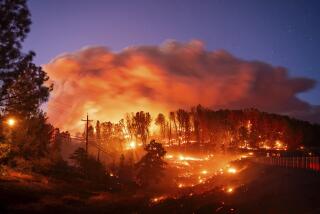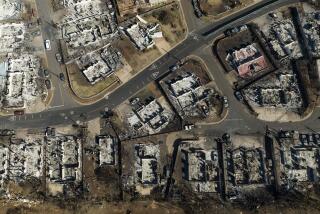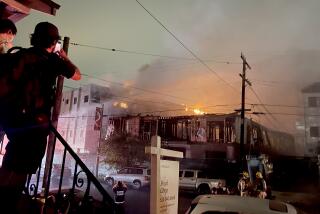Teen Sentenced for Setting Fire in Anaheim Hills
ORANGE — In tear-filled proceedings, a Superior Court judge on Thursday sentenced a 17-year-old boy to serve eight months in custody for setting a fire in Anaheim Hills, one in a series of recent wildfires in Southern California.
A few relatives of the convicted teen-ager sobbed loudly as Superior Court Judge Anthony J. Rackauckas Jr. also ordered him to pay some restitution, serve probation and receive counseling for starting the Oct. 26 blaze that destroyed two homes, threatened 29 others and burned 750 acres.
“It’s just accidental that no one died in this fire,” Rackauckas told the teen, who was expressionless as he listened to the sentence. “You could be looking at murder charges.”
The sentencing at Juvenile Court was an unusually solemn proceeding.
Seated on one side of the courtroom were the teen’s mother and other family members, who have held that the teen-ager simply made a stupid mistake when he and several friends were hanging out, some drinking high-alcohol-content beer and smoking marijuana, on a hillside off Stage Coach Road near the border of Villa Park and Orange.
The teen-ager, a dropout from Canyon Acres High School in Anaheim Hills, has told investigators that he had accidentally dropped a match and did not intentionally start the wildfire.
On the other side sat John O’Neill and his neighbors Janet and Rick Wooley, the two homeowners who say their children’s lives were devastated after the fire destroyed their properties and priceless mementos.
Since his Nov. 8 arrest, the teen-ager’s name has remained confidential in keeping with juvenile court guidelines to protect youthful offenders from public exposure.
A two-day trial, which resulted in the teen’s conviction Dec. 17, was closed to the public. But on Thursday, both prosecutor Carl Biggs and defense attorney Dennis M. McNerney had no objections to news reporters being in court for the sentencing on the condition that they not disclose the teen’s identity.
Early in the proceedings, Rackauckas denied a request by the teen’s attorney to have a new trial on the grounds that two witnesses who testified during the trial had since come forward to say they had smoked marijuana shortly before they were interviewed by investigators.
“It is inconceivable to the court that the additional information . . . would make any difference to the outcome,” Rackauckas said.
Biggs, a former firefighter, later called as a witness Janet Wooley, whose family’s home sustained more than $400,000 in damage from the fire.
“It has obviously been very devastating,” Wooley said, mentioning problems the family is encountering with insurers.
Wooley said priceless mementos from her mother, who died in September, all were lost in the fire.
O’Neill related that when the fire started, he told his three sons--ages 20, 16 and 14--to place their most prized belongings in the middle of their rooms so they could retrieve them quickly.
They followed his orders, but the fire swept through the house minutes later, leaving them only with the shorts and T-shirts they were wearing, he said.
“We lost everything,” O’Neill said. “Yearbooks. Pictures. Trophies. Every day there’s something that they miss. We will try to rebuild it back together . . . but after 23 years of marriage, all we got out is some pictures, family albums of the kids.”
Rackauckas asked O’Neill if he had any thoughts on the convicted teen’s sentence.
“It’s a difficult thing,” O’Neill said. “I got three boys myself. It could have been any one of my kids standing up there on the hill.
“I would hope that my kids would have the presence of mind” not to place people in a dangerous situation, but “it’s a difficult decision . . . and I don’t think I’m qualified to make a decision like that.”
However, defense attorney McNerney urged the judge to be lenient.
Noting O’Neill’s comments, McNerney said: “There but for the grace of God this could be any parent’s nitwit, (but) this time it was this nitwit messing around with the Santa Anas”--a reference to the strong winds that helped fan the flames.
McNerney said that since the arrest, the teen has been behind bars at Juvenile Hall in Orange, adding that “he’s not a threat to society.”
Before he delivered the sentence, Rackauckas said he felt that he was in the middle of a conflict--punishing a youthful offender while also helping him to get his life back on track.
But Rackauckas said he did not believe the teen’s story that he set the fire accidentally.
“Someday it’s going to benefit you to look at it and be more honest about what it is that occurred here,” Rackauckas said, believing the youth deliberately started a small fire, but he didn’t expect it to quickly rage out of control.
Noting the teen-ager told probation officers that he wanted to finish high school, Rackauckas ordered the teen to attend classes while in custody.
Rackauckas also ordered the teen to pay a $1,000 restitution fine, plus undetermined out-of-pocket restitution costs to the fire victims, and to serve 20 days in a juvenile court work program.
The youth, who was dressed in blue Juvenile Hall fatigues, was led from court by a bailiff. Members of his family left the court in tears, declining to comment.
Later, the boy’s uncle, Bill Daniels, said he thought the sentence was too harsh.
“The (sentence) did not seem to match the information” that he was sorry and it was an accident, Daniels said.
In the court’s parking lot, Daniels approached O’Neill and the Wooleys and said solemnly, “I’m sorry.”
Janet Wooley told a reporter the judge’s decision was fair.
“He’s going to be out (of custody) before we’ll be back in our house,” Wooley said. “For us, (1994) is going to be a very long year.”
More to Read
Sign up for Essential California
The most important California stories and recommendations in your inbox every morning.
You may occasionally receive promotional content from the Los Angeles Times.










